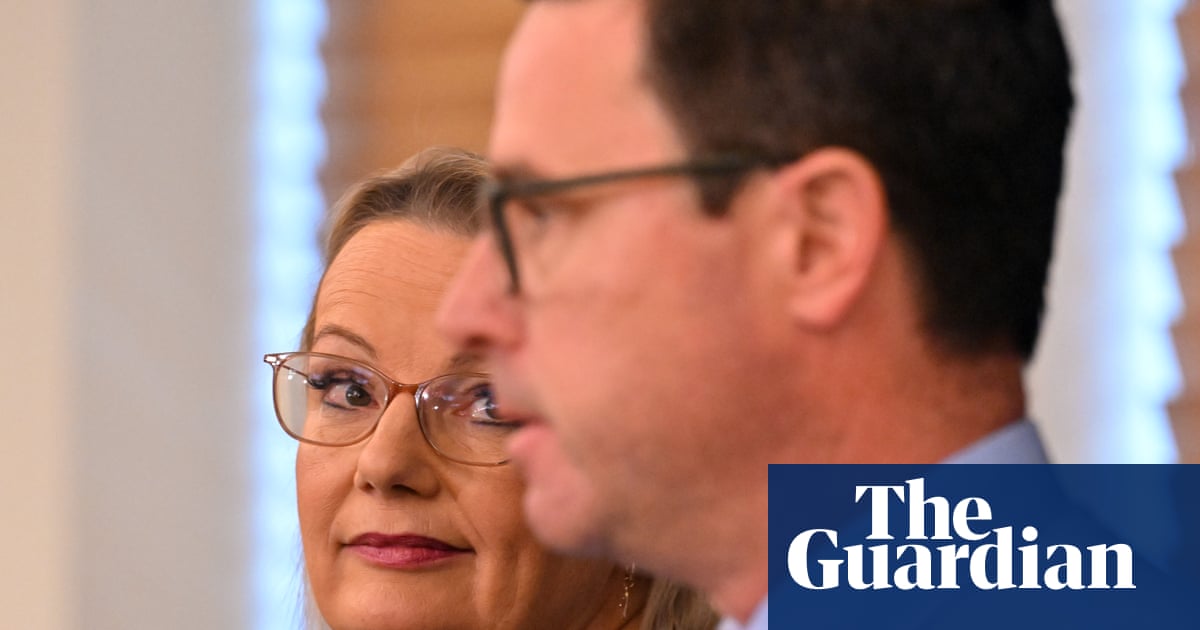After what can only be described as an awful start to a new opposition term, Sussan Ley and David Littleproud stood side by side on Wednesday toname a new Coalition frontbench.
Like an estranged couple who get back together after admitting what they really think of each other, the two leaders awkwardly sought toput their damaging but short-lived split behind them.
But for both Ley and Littleproud,this early stepwas also a test of leadership, and showed up the deep divisions in both parties.
Ley had to look after both her own supporters and those who backed Angus Taylor, the new shadow defence minister, inthe tight Liberal leadership ballot.
Littleproud had to force generational change in the Nationals, as he faces growing unhappiness and loose chatter of a challenge from former frontbenchers Barnaby Joyce and Michael McCormack.
Ley saidher choicesreflect the full range of philosophical traditions, values and perspectives within the Coalition, and promised to harness her team’s full “intellectual and philosophical firepower”.
Sign up for Guardian Australia’s breaking news email
Some of the appointments are promising.
Julian Leeser returns as shadow attorney general, after quitting the frontbench over Peter Dutton’s position on the voice to parliament. James Paterson and Andrew Hastie move to broaden their experience, taking on finance and home affairs respectively, while Tim Wilson returns to shadow cabinet in industrial relations. Angie Bell and Andrew Bragg both move up the ranks.
Ley punted conservative diehards Sarah Henderson, Tony Pasin and Claire Chandler, and promoted up and comers Maria Kovacic and Zoe McKenzie. Promising talent including Aaron Violi missed out this time.
For his part, Littleproud moved Joyce and McCormack on, talking up generation renewal while promoting Ross Cadell and Anne Webster.
Liberal Jane Hume was among the biggest losers of Wednesday’s announcement. Smart, capable and energetic, Hume paid the price for Dutton’s work-from-home policy,a political stink bombthat went off just in time to alienate voters who thought their own flexible work arrangements were under threat.
Sign up toBreaking News Australia
Get the most important news as it breaks
after newsletter promotion
A former public servant herself, Ley promised to respect the bureaucracy as opposition leader. She said Hume would still have a lot to offer from the backbench.
Similarly, Nationals defector Jacinta Nampijinpa Price’s Doge portfolio is gone, and she is demoted out of shadow cabinet with defence industry and defence personnel. She angered both the Liberals and the Nationals by switching party rooms to run on Taylor’s ticket, only to sit out the vote for deputy leader after he lost to Ley.
More broadly, theCoalitionis showing early signs of moving away from Trump-inspired policy, recognition of how badly links to the unpopular US president played for Dutton at the election. While we shouldn’t expect a return to the Make Australia Great Again agenda anytime soon, Paterson is sure to be tough on wasteful spending in his new job in the finance portfolio.
Immigration faces a Coalition reset too. Dan Tehan is moved to energy, and Queenslander Paul Scarr takes on managing overseas arrivals and international students. Scarr, a smart details-oriented lawyer, is expected to bring an economic focus to the portfolio, putting aside the culture wars of the past term.
Net zero by 2050 policieswill be an early test of any newfound Coalition harmony. Both parties are split on carbon emissions, even as Labor promises to use the next three or six years to push ahead with the transition to renewables.
Leaders rarely win many friends in frontbench reshuffles. In addition to winning back millions of voters lost on 3 May, Ley and Littleproud need this lineup to heal party wounds and aid the long road back to relevance with voters.
It will be anything but easy.
Tom McIlroy is chief political correspondent for Guardian Australia
